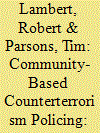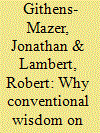| Srl | Item |
| 1 |
ID:
156624


|
|
|
|
|
| Summary/Abstract |
This article presents recommendations for practitioners of community-based counterterrorism policing. The recommendations are located and explained within two broad propositions: recognize the implications and limitations of policing by consent, and respect the legitimate religious beliefs of all communities. Highlighting tensions between high and low policing and between policing and government imperatives, the article helps illustrate how different aspects of counterterrorism policy and practice may sometimes be at odds with one another. The recommendations are aimed at recognizing and, where practicable, reconciling such tensions. They arise from the authors' engagement with the issues in London and are understood to have application in other towns and cities in the United Kingdom and the West, particularly in communities and neighborhoods where Muslim citizens are the principal recipients of this form of policing.
|
|
|
|
|
|
|
|
|
|
|
|
|
|
|
|
| 2 |
ID:
096755


|
|
|
|
|
| Publication |
2010.
|
| Summary/Abstract |
Politicians, the media, and some academics are getting it wrong about radicalization. Relying on simple narratives to explain how an individual departs from point a ('a good Muslim boy') to point b ('a suicide bomber'), too many recent contributions to academia rely on assumptions and 'conventional wisdom' rather than testable and falsifiable empirical research and methods. Through specific cases, this article seeks to demonstrate how the over-simplification of 'conventional wisdom' privileges convenient political narratives over the complex realities of such situations. In light of this failure to account for reality, this article seeks to challenge current thinking on radicalization by exposing its limitations, as currently being used, as a meaningful basis and departure point for rigorous social science research. The article concludes by showing how the current persistence of this 'conventional wisdom' approach to radicalization ultimately betrays the normative political assumptions of those who insist on using this term, and how this adherence to 'conventional wisdom' now deprives radicalization from being a relevant and useful academic or policy discourse. This is because radicalization as an area for study has been corrupted by its instrumental political application.
|
|
|
|
|
|
|
|
|
|
|
|
|
|
|
|